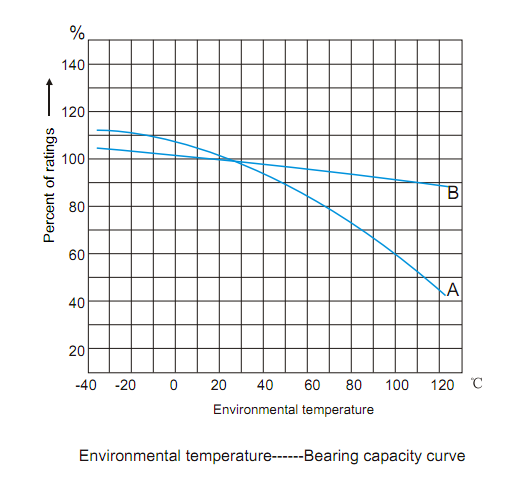What is derating?
We recommend that the actual working current of a fuse should not exceed its rated current under the ambient temperature of 20℃. While selecting the fuse, environment and working conditions should be considered, such as the sealed situation, air flow, wire sizes(length and section) and instantaneous peak value, etc.. The current load capability of a fuse is tested under the ambient temperature of 20℃. However the actual load capability is affected by the ambient temperature. The higher the ambient temperature, the higher the working temperature and the shorter the service life of a fuse will be. Conversely, the service life of a fuse will be longer when working under a lower ambient temperature.
The following typical curve displays the effect of ambient temperature on the current load capability.

Note: A: (gG) type for line protection
B: (aR) type for semiconductor protection
Example: Assume that the ambient temperature is 20℃, choose a gG type fuse with rated current In=63A, reducing working current is necessary when the ambient temperature is changed to 70℃. In the environmental temperature-bearing capacity curve, A shows that the rating should be 78% at 70℃, and the new rating should be determined as: In= 6 3/0.78 =80.77A
So a fuse with rated current In=80A should be selected for the new ambient temperature.
Selecting overcurrent protection.
During normal load conditions, the fuse must carry the normal operating current of the circuit without nuisance openings. However, when an overcurrent occurs, the fuse must interrupt the overcurrent and withstand the voltage across the fuse after internal arcing. To properly select a fuse, the following items must be considered:
• Voltage rating (AC or DC voltage)
• Current rating
• Normal operating current
• Ambient temperature
• Overload conditions and opening times
• Available short circuit current
• Melting Integral (I²t)
• Pulse and In-rush characteristics
• Characteristics of equipment or components to be protected
• Physical size and available board space
• Standards requirements
I agree to receive CHORDN Newsletter *

By clicking“Accept All Cookies”, you agree to the storing of cookies on your device and to the associated processing of data to enhance site navigation, analyze site usage, and assist in our marketing and performance efforts. To find out more about the cookies we use, see our Privacy Policy .
Accept All Cookies

